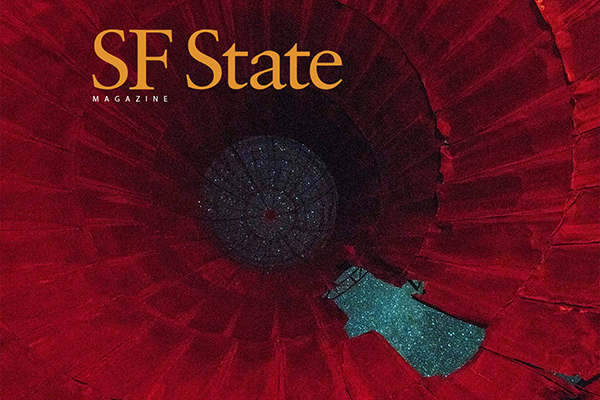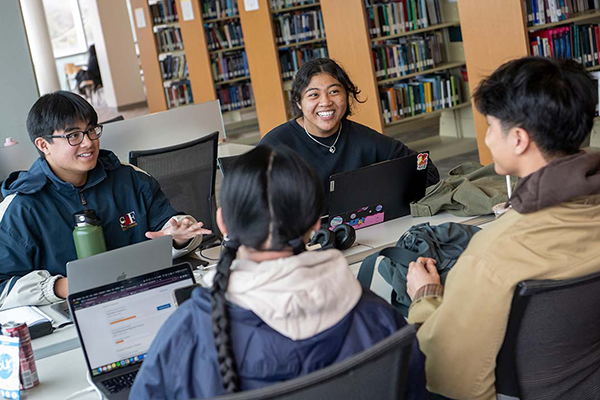News and Announcements

SF State Magazine’s fall/winter 2023 issue puts the environment in the spotlight. Now available online, the issue includes articles about the many ways alumni, students and faculty are working to explore and protect the planet.
In some ways SF State’s best-kept secret, the Sierra Nevada Field Campus gets some much-deserved attention in a feature story about this bastion of Earth science, art and learning in the middle of the wilderness. Another feature, “Money Matters,” explores the ways forward-thinking alumni, students and faculty are demonstrating how investors can bankroll environmental sustainability (and turn a profit doing it). The feature “Forces of Nature” offers up 14 ways the University is engaged in environmental stewardship. And a special video feature, “Driven to Help the Planet,” highlights an enterprising student’s efforts to create a mobile “tiny home” using recycled and renewable materials.
The magazine’s departments are filled with environmental angles, too, including profiles of alumni activists and a story about a new Sustainable Materials Learning Library that’s helping students get a handle on Earth-friendly design. SF State Magazine columnist (and legendary journalist and Gator) Ben Fong-Torres contributes a conversation with alumna Allison Crimmins, director of the federal government’s Fifth National Climate Assessment. The magazine’s “Five Questions” Q&A department expands to more questions (and more subjects) than usual with a discussion with the three co-directors of the University’s new hub for climate change-related activities, Climate HQ. And alumna Lisa D. White (B.A., ’84), director of education at UC Berkeley’s Museum of Paleontology, shares a very personal “My SF State Story” exploring how her and her sisters’ endowment for scholarships for SF State students honors their remarkable parents, who met on campus in the 1950s.

U.S. President Joe Biden recently issued an executive order on managing the risks of artificial intelligence (AI), and the European Union is discussing AI laws abroad. While the news has been flooded with stories of self-driving cars, Chat GPT and how AI will affect jobs, a group of SF State faculty has been concerned by the ethical implications of AI for years.
That’s why they developed SF State’s Graduate Certificate in Ethical Artificial Intelligence in 2019. The program was created by Computer Science Professor Dragutin Petkovic, Lam Family College of Business Professor Denise Kleinrichert, and Philosophy Professor Carlos Montemayor. They’ve seen the impact of this program on students and think this type of education is as important as ever. Any SF State graduate student and anyone with a bachelor’s degree (non-matriculated post-baccalaureates) can apply for the program.
“People don’t understand the issues of AI and its impact to society. It can create problems because now it’s everywhere,” Petkovic explained, noting that the potential problems are not just limited to a single industry. “In my opinion, [ethical AI education is the] most consequential project I’ve been working on by far.”
AI technologies continue to grow and impact everything from health care, defense, media, education and more. Despite advances, AI systems can still produce errors, demonstrate biases and lack transparency in decision making. The faculty knew that everyone — AI users, educators, politicians, lawyers, auditors and others — would need access to ethical AI education to make informed decisions.
“The professors are not talking to you as though you’re already an expert in the subdomains,” said Rafael Ayala (M.A., ’22), who works at the software corporation Autodesk in third-party risk management. “They are making sure we have access to broad scopes of knowledge and bringing people together.”
Ayala came to SF State with a background in philosophy and education. As a first-generation student and the first in his family to go to college, it wasn’t easy for him to tell his family he was leaving his paid job to pursue a master’s degree in Philosophy. Though he partly chose SF State because of the Ethical AI program — he could see its growing prominence in everyday life — he had no aspirations for a career in tech.
“The program did a great job of helping me build up that technical prowess and having the vocabulary I needed,” he explained, crediting the certificate for building his confidence to work at Autodesk. “I am working in tech, and … artificial intelligence is huge and we need to constantly evaluate [it].”
As part of Adobe’s legal team, attorney Ted McCullough became more interested in AI two years ago. He enrolled in the certificate program because he wanted to know about the ethical dimensions of the technology, but also had technical computer science questions. He was recently promoted to a director role on the legal team at Adobe, in part due to the AI expertise he gained from the certificate program.
“[SF State’s program] seemed like a really good fit because it had everything that I was looking for in terms of a computer science curriculum, a philosophy curriculum and a business curriculum all with a practical bent,” he said.
Coming in with an academic background in computer science and philosophy, McCullough feels there’s often a curriculum gap between the math and science of AI and the policy issues, but that this certificate helps begin filling that gap.
The certificate was designed to be accessible for any non-expert, Petkovic said. He hopes more students, working professionals, and employers take advantage of the University program. Though the certificate requires a bachelor’s degree for enrollment, he encourages undergraduates and anyone else interested to reach out to the him and his faculty colleagues about possible options.
“We need to educate people, but then there has to be some level of regulation … ,” Petkovic said, emphasizing why everyone from computer scientists to government officials should receive a holistic education on AI. “We are one part of the puzzle.”
Learn more about the Graduate Certificate in Ethical Artificial Intelligence.

President Mahoney and her cabinet invite all staff and faculty to an End of Year Celebration recognizing all your hard work in 2023. It takes place Thursday, Dec. 14, in Jack Adams Hall, Cesar Chavez Student Center.
Zoom’s AI Companion and AI Summary features are coming to all SF State Zoom accounts on Wednesday, Jan. 17. Simultaneously, Otter.ai will no longer be able to connect to SF State-hosted Zoom sessions.
Only 13 days remain until the deadline to submit applications for the Call to Service Grants. The Institute for Civic and Community Engagement (ICCE) accepts applications through Sunday, Dec. 17.
These grants support SF State faculty and staff in their community-engaged activities, research endeavors and community service-learning course development.
For questions or concerns, please email ICCE or call (415) 338-6419.
The Library reminds all instructors teaching spring 2024 courses to please submit requests for new course reserve materials no later than Tuesday, Jan. 2. This ensures that all materials are available to students by the first day of spring instruction.
Placing required course materials on reserve helps lower the financial burden for students.
To place books on reserve not in the Library’s collection or already owned by the Library, please fill out the reserve request form.
The form is not necessary to reserve personal copies of books. Simply bring the books to the Book Checkout & Drop-off desk on the first floor of the Library and fill out a short form.
To make any changes to an existing course reserve list or course details, please fill out the online reserve request form selecting the “Renewals” option. If you do not wish to make any changes, no action is necessary.
For questions, email Course Materials Specialist Elliott Scheuer or call him at (415) 338-3473.
At the end of each semester, the J. Paul Leonard Library reinvents the Events Room (Library 121) to serve as the Wellness Room, a place where students can do their work, get a snack, find helpful resources or unwind with coloring, puzzles, crafts and more. This semester it is held Sunday, Dec. 3 – Thursday, Dec. 14.
Wellness Room hours:
- Monday – Thursday, 7 a.m. – midnight
- Friday, 7 a.m. – 7 p.m.
- Saturday, noon – 6 p.m.
- Sunday, noon – 9 p.m.
Campus partners at Health Promotion & Wellness, Food+Shelter+Success and the Tutoring & Academic Support Center provide essential support for the Wellness Room.
To learn more, email librarian Melanie Smith.
The Center for Equity and Excellence in Teaching and Learning (CEETL) hosts a workshop Thursday, Dec. 7, at 10 a.m. in Library 242. The title is “Justice, Equity, Diversity and Inclusion (JEDI) Journaling in Community: Social Media as a Reflective Teaching Tool.”
Facilitated by Jessica Adams-Grigorieff, Ph.D., this workshop explores how social media platforms like Twitter, TikTok or YouTube can be spaces for self-reflection, pedagogical growth and community. Participants will explore teaching communities online and practice reflecting by making their own media posts. While the workshop will focus on reflective teaching practice, it will also briefly consider faculty use of social media journaling with students.
Visit the CEETL website for more information or to register.
The Poetry Center welcomes poet, scholar, editor and educator Divya Victor, for a special day-long pair of programs on Saturday, Dec. 9, in downtown Berkeley at the East Bay Media Center, 1939 Addison St.
Starting at 2 p.m., Victor will read from her poetry, then join in conversation with George and Judy Marcus Chair in Poetry Tonya M. Foster for a third gathering under the rubric “Undisciplining the Fields: Study, Performance, and (Re:)Creation,” organized in collaboration between The Poetry Center and the George and Judy Marcus Endowed Chair in Poetry.
“Undisiciplining the Fields” is a new conversation, reading (and sometimes performance) series that invites writers, artists, filmmakers, and scholars from a range of fields to discuss and share their cross-disciplinary practices and thinking, initiated by Foster, in collaboration with The Poetry Center.
Visit the event page on The Poetry Center website for more information.
At 6 p.m., Victor will deliver the 39th annual George Oppen Memorial Lecture. This latest manifestation in a 40-year-long opportunity to address and awaken the possibilities of poetic thinking in the vicinity of poet George Oppen and peers, opening routes toward inheriting, reinterpreting and transforming such work and its legacy.
The George Oppen Memorial Lecture is supported by the Dorothy A. Fowler Trust.
The Center for Equity and Excellence in Teaching and Learning holds its second “WE WEDNESDAY” event on Wednesday, Dec. 13, noon – 1 p.m., in Library 240.
“WE WEDNESDAY” is a space for University colleagues to come together in shared interests and learn to cultivate rest, joy and community in our academic lives. No RSVP required. Please drop in to connect with peers and enjoy goodies from our holiday bake exchange or just to take a break. Bring your favorite baked item and the recipe page to share if you can.
The University Budget Committee (UBC) invites the campus community to its next meeting on Thursday, Dec. 14, 10 a.m. – noon, via Zoom. All campus community members are welcome to attend this meeting. Topics include a wide range of finance-related topics that affect every part of campus operations.
Members of the UBC are staff, faculty, students and administrators. Visit the Administration & Finance website for more information on the committee.
UBC members offer “office hours” on Fridays after the monthly meetings via Zoom to answer questions about budget-related matters.
To RSVP and receive the agenda, email the University Budget Committee.
SF State Spotlight
Public Health Lecturer Jessica Wolin and colleagues at the Center for Equitable Higher Education have released the “RISE Framework: A Socio-Ecological Model for College Student Basic Needs.”
Wolin is featured on an episode of the recent podcast “Building Justice” and will be the spotlight presenter at the 2023 Real College California Summit in December.
In February, Wolin and colleagues will present the RISE model at the California Higher Education Basic Needs Alliance Intersegmental Basic Needs Summit.
SF State’s student-run Martin Wong Gallery is featured in a new San Francisco Arts Commission poster series in bus shelters celebrating Asian American trailblazers.
The Martin Wong Gallery was established with a gift from Wong’s mother, Florence Wong Fie.
Jamillah Moore, vice president for Student Affairs and Enrollment Management, contributes an opinion article to a Psychology Today series titled “Putting America to Work.” Her article, published Nov. 20, presents strategies for more women to return to the workforce post-pandemic.
“Empowering women leaders and increasing their workforce participation post-COVID requires a concerted effort from businesses, governments and society as a whole,” Moore wrote. “Businesses that are dedicated to supporting women in the workforce are not only commendable, but also a testament to the transformative power of gender diversity.”
An article on Nov. 27 in the Los Angeles Times credits SF State as an “early incubator” of disability studies. This fall, SF State became the second CSU campus to establish a minor in the subject.
Emily Smith Beitiks, interim director of the Paul K. Longmore Institute on Disability, is quoted in the article.
“My entire time at SF State we’ve been trying to get a Disability Studies minor,” she said. “That we had eugenics courses on the books but we’re fighting to get Disability Studies on the books is painful.”
Performances at traditional classical music venues are reaching younger audiences with video game music, KQED reports.
Music Lecturer Steve Horowitz has composed music for video games a teaches a class at SF State on the topic.
“What’s happening with game music is just an extension of what happened with film music coming into the concert hall,” he said in the Nov. 22 story. “For years and years, the symphonies, and especially the established large groups, have been looking for ways to tap into younger audiences, to bring more diverse audiences into their concerts.”
Cinema Professor Joseph McBride and Michael Wilmington are the authors of “John Ford,” a critical study of the late film director. University of Kentucky Press recently published a new expanded and revised edition.
In this groundbreaking critical study, McBride and Wilmington provide an overview of Ford’s career and in-depth analyses of his key films. The new version includes a study of the 27 Ford silent films now known to survive in whole or in part (more than double the number available when the original edition was published); essays on three controversial aspects of Ford: his tragicomic sensibility, his views of race and the influence of his Irish heritage; and an expanded version of McBride’s interview with Ford on the last day of his career.
The late actor and director Peter Bogdonavich praised the book as “the first intelligent, informed and informative critical study in English on one of the only American directors who was also a poet.”
Asian American Studies Professor Russell Jeung and Humanities Emeritus Faculty Peter Richardson will participate in a forum at the Commonwealth Club of California on Monday, Dec. 11, at 5:30 p.m. “Redemptive Dreams: Engaging Kevin Starr’s California Past, Present and Future” will explore the legacy of the late historian and California state librarian Kevin Starr.